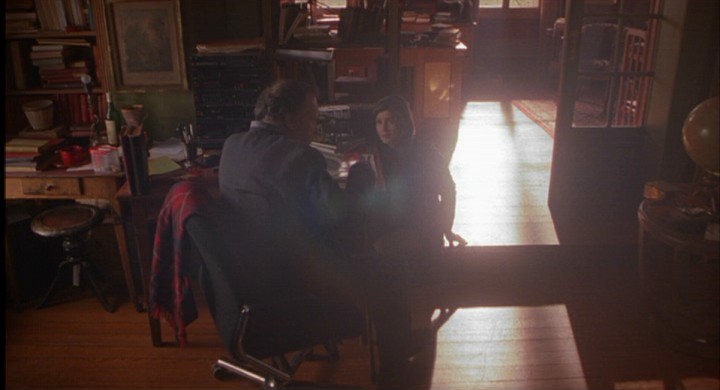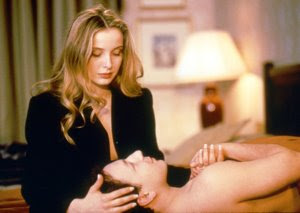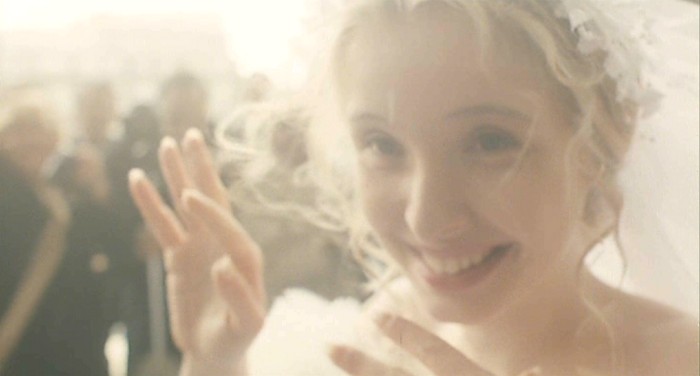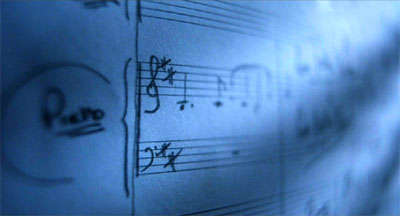From the Chicago Reader (December 16, 1994). — J.R.

Red
**** (Masterpiece)
Directed by Krzysztof Kieslowski
Written by Krzysztof Piesiewicz and Kieslowski
With Irene Jacob, Jean-Louis Trintignant, Frederique Feder, and Jean-Pierre Lorit.

A film of mystical correspondences, Red triumphantly concludes and summarizes Krzysztof Kieslowski’s “Three Colors” trilogy by contriving to tell us three stories about three separate characters all at once; yet it does this with such effortless musical grace that we may not even be aware of it at first. Two of the characters are neighbors in Geneva who never meet, both of them students — a model named Valentine (Irene Jacob) and a law student named Auguste (Jean-Pierre Lorit )– and the third is a retired judge (Jean-Louis Trintignant) who lives in a Geneva suburb and whom Valentine meets quite by chance, when she accidentally runs over his German shepherd.
Eventually we discover that Auguste and the retired judge are younger and older versions of the same man (neither of them meet, either). Another set of correspondences is provided when, in separate scenes, Valentine and the judge are able to divine important facts about each other: he correctly guesses that she has a younger brother driven to drug addiction by the discovery that his mother’s husband is not his real father; she correctly guesses that he was once betrayed by someone he loved — which also happens to Auguste during the course of the film. Read more
From the Chicago Reader (June 17, 1994). — J.R.

** WHITE
(Worth seeing)
Directed by Krzysztof Kieslowski
Written by Krzysztof Piesiewicz and Kieslowski
With Zbigniew Zamachowski, Julie Delphy, Janusz Gajos, Jerzy Stuhr, Grzegorz Warchol, and Jerzy Nowak.

“Imagine a kind of filmmaking that’s truly in tune with the ways you think and relate to other people. A deeply humane kind of filmmaking, but free from ‘humanist’ lies and sentimental evasions. Not a dry, ‘realistic’ kind of filmmaking, but one in which all the imaginative and creative efforts have gone into understanding the way we are. A kind of filmmaking as sensitive to silence as to speech, and alert to the kind of meanings we prefer to hide away. To my knowledge, only two directors in the world are currently making films like that. One is Krzysztof Kieslowski in Poland. The other is Edward Yang in Taiwan.”
These rousing words by Tony Rayns in the June issue of Sight and Sound were just what I needed to read after returning last month from Cannes, where wonderful films by Yang and Kieslowski about contemporary life were showing in competition. They were the two best competing films that I saw, though neither won any prizes. Read more
From the Chicago Reader (February 11, 1994). — J.R.

*** BLUE
(A must-see)
Directed by Krzysztof Kieslowski
Written by Kieslowski and Krzysztof Piesiewicz
With Juliette Binoche, Benoit Regent, Florence Pernel, Charlotte Very, Helene Vincent, Emmanuelle Riva, and Philippe Volter.

Indisputably the work of a master, to a much greater degree than anything else around at the moment, Krzysztof Kieslowski’s first feature without reference to his native Poland is sufficiently contemporary and allegorical to take the future of Europe, and a “unified” Europe at that, as one of its themes. Palpably concerned with loss and regeneration, suffering and transcendence, Blue calls to mind some of the better late works of Ingmar Bergman in its powerful sense of dramatic concentration; it doesn’t have quite the undertow of neurosis that presumably made those films so exemplary for Woody Allen, but it does have a much bolder grasp of the movements and vagaries of consciousness.
In the opening moments of Blue the leading character, Julie (Juliette Binoche), loses both her husband, a famous French composer, and her five-year-old daughter in a car crash; the remainder of the film charts her mental and spiritual recovery. The film’s remarkable economy is already apparent in the opening shot — a close-up of the spinning right front wheel of the car, seen from behind, as it speeds down a highway. Read more






